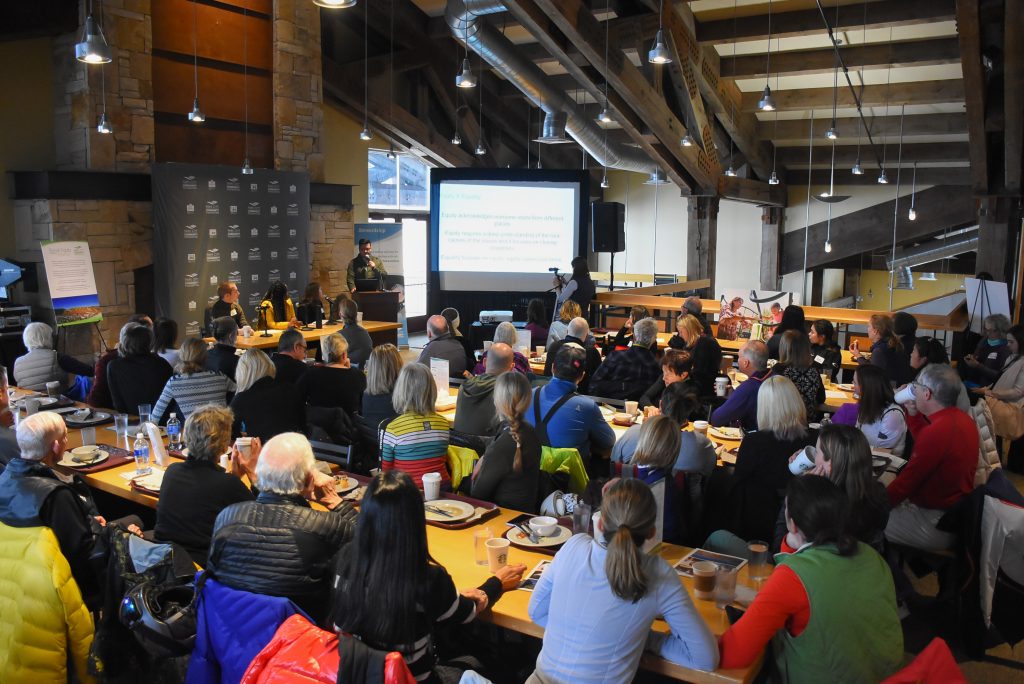
It’s one thing to want the best for the community. It’s another thing to know how to talk about it. Those who care deeply can struggle mightily with discussing hot button issues like diversity, inclusion and privilege. That struggle can silence dialogue on issues that deserve attention, like social equity. Some may worry, “Am I using the right words? Is this the right question? Will I be understood?”
How, exactly, can those who care about social equity have these important conversations?
On Jan. 21, Park City Community Foundation’s first Crest Speaker Series event of 2020 tackled this head-on. Diego Zegarra, Social Equity Director at Park City Community Foundation, led the panel discussion ‘Understanding Equity and Inclusion’ by first assuring the 75-member audience that it’s intention, not perfection, that matters.
“We’re all going to make mistakes,” Zegarra said. “I’m here to tell you it’s okay not to have that language.”
The panel featured Park City councilmember Becca Gerber, Park City school district administrator Dr. Claustina Mahon-Reynolds, and Equality Utah regional coordinator Daniel Potter. The three examined the interconnectedness of Park City’s most pressing problems and the barriers to their solutions, and how to define goals and success.
Zegarra first defined equity and inclusion – terms than can mean different things to different people. Conversation flows from having a generally agreed-upon understanding of the terms, he said.
Consider diversity as a guest list of who is at the table, so to speak. Inclusion, then, is the environment at the table: Who is being heard and making decisions?
When discussing equity, think of it as considering what people need to succeed. The concept of equity takes into account root causes and focuses on reducing disparities. If equality is having five apples and giving one apple each to five children, equity asks who had breakfast and who didn’t, who has an allergy or needs their apple cut up.
Panel speakers agreed that Park City’s current challenges include several side effects of extreme income inequality: affordable housing, health care, food security and early childhood education needs for many residents.
“We watch haves and the have-nots come together at Ecker Hill Middle School. Some kids’ parents live in giant estates, and some kids’ parents clean those estates,” Mahon-Reynolds said. “As educators, how do we bridge that gap?”
As an example of an unintended consequence of income inequality, Mahon-Reynolds cited her school’s policy of giving every student a computer and making online homework integral to success – then finding out how many kids didn’t have Wifi at home.
Gerber underscored the interrelation of other community challenges: “Fifteen thousand cars a day drive into Park City for work,” she said. Affordable housing in town would clearly relieve traffic pressure.
Potter talked about the importance of ground-level efforts such as learning how to get people to the table by considering workplace schedules and childcare needs so underrepresented groups can be part of strategizing and solutions.
And all mentioned the need for people to get out of their conversational comfort zones:
“We all carry a different type of privilege,” Mahon-Reynolds said. Talking about privilege “is not about guilt or anger about privilege; people can use their privilege for the betterment of others.”
Gerber cited a recent visit with Latinos in Action, a student group at Park City High School, as illustrating how critical and painful situations are for some local families. Members of the group told Gerber how much their parents paid for rent and bills each month – numbers others their age are blissfully unconcerned with – and how they sometimes struggle with overcrowding, lack of privacy and dangerous conditions in multi-family housing.
The discussion was followed by questions and answers examining specific goals, markers of success and paths forward.
Gerber said the city hopes to get to 15 percent of its workforce living local, and called upon anyone who’d like to help to join the city’s housing task force. School district goals include early education improvements such as universal full-day preschool to get all young children ready for Kindergarten. Potter discussed community mental health goals around safety networks, safe neighborhoods and expansion and utilization of mental health resources.
As greater Park City continues to grow, Park City Community Foundation believes that we can preserve our sense of community and ensure that inequalities don’t increase by providing equitable access to opportunities for all. As a fair-minded advocate, Park City Community Foundation facilitates collaboration among stakeholders of Park City’s Social Equity Strategic Plan. Discussions about implementing the plan, as well as its ability to help make our community a place where everyone feels respected, included, safe, and empowered, will happen throughout 2020.
The Crest Speaker Series occurs three times each year and combines fun activities with great speakers – for this event, attendees enjoyed first tracks at Park City Mountain and breakfast before the panel discussion – with the chance to meet other local philanthropists and meaningfully examine current issues that concern us all. The event was sponsored by Vail Resorts EpicPromise.
See the photo album of the event on Facebook >